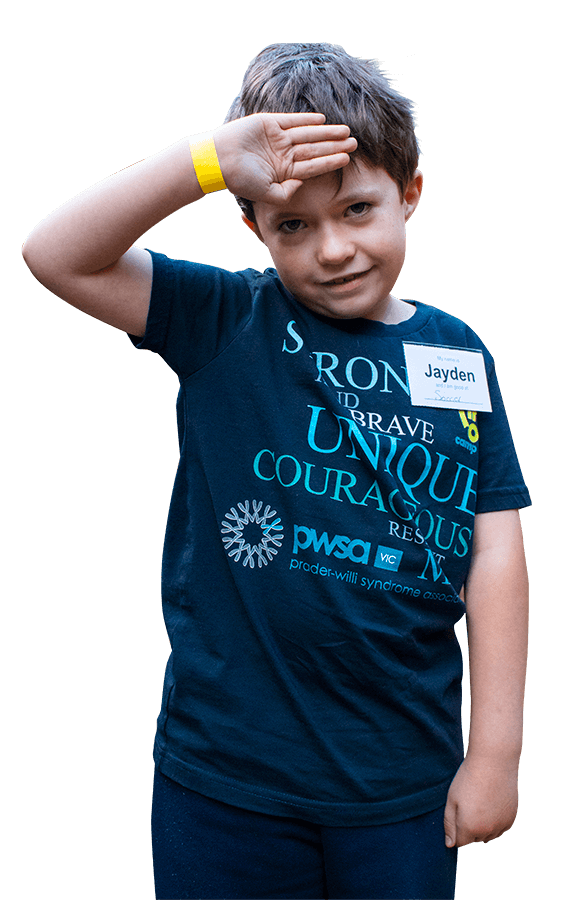How is Prader-Willi Syndrome Characterised?
Prader-Willi Syndrome (PWS) is a multistage spectrum condition. Prader-Willi Syndrome affects the part of their brain called the hypothalamus, which is responsible for the regulation of all the systems in the body and the resultant control of hunger, thirst, temperature regulation, pain and stimulation hormone production amongst others.
At the beginning of life or the “failure to thrive” stage, weight gain is slow and developmental milestones are delayed. The baby tends to be “floppy” due to low muscle tone, affecting their ability to suck, leading to poor weight gain and necessary intervention.
As muscle tone improves, the extreme lethargy, floppiness and feeding issues are left behind. An increased interest in food and later chronic feelings of insatiable hunger and a slowed metabolism can lead to excessive eating and life-threatening obesity, and this is a defining characteristic of PWS known as hyperphagia. This stage can begin somewhere between the ages of three and eight years old. The age of onset and intensity varies greatly. With adequate environmental controls in place, maintaining a healthy weight can be challenging but is possible.
PWS can have a significant impact on behaviour, learning, mental and physical health, community inclusion and social relationships. People with PWS exhibit high anxiety, complex and challenging behaviours and cognitive dysfunction throughout their lives.
Other Characteristics seen in individuals with PWS include:
- Short stature and small hands and feet and characteristic facial features to some degree.
- high pain threshold.
- scoliosis, hip dysplasia, foot and lower limb abnormalities.
- incomplete sexual development.
- sleep disturbances with excessive daytime sleepiness.
- growth hormone and other hormone deficiencies affecting growth and fertility
- a range of possible medical conditions including optical, dental, respiratory and skeletal-muscular issues.
- cognitive dysfunction and learning disabilities
- poor short-term working memory/ Superior long-term memory
- speech apraxia/dyspraxia
- charismatic, friendly and caring personalities
- eager to please
- strong determination and resilience
- Autism-like Spectrum Disorder and Psychosocial disability
Some of the other factors that may cause difficulties to include adverse reactions to medications, high pain tolerance, respiratory issues, lack of vomiting, and unstable temperature. Adrenal insufficiency may also occur. Severe medical complications can develop rapidly in individuals with PWS. Often the severity of a clinical symptom may be underestimated until the condition warrants immediate attention. Therefore caution should be taken in interpreting a seemingly minor complaint in someone with Prader-Willi Syndrome
Children with Prader-Willi Syndrome often attend local kindergarten and primary school. Some may go through high school or attend a special school to learn life skills. People with PWS often work in supported employment. Unfortunately, successful Independent living in the community is rarely achieved. With an estimated 400 individuals living in Victoria alone and a life expectancy of 37 years of age, those affected by PWS require significant support to manage the complex needs throughout their entire life. Support is available through NDIS. Further information relating to NDIS is available on the Funding Support for you and your child page on our website.
Research has shown that people with PWS require and benefit immensely from holistic care because of the complexities of the medical condition and their interdependencies between poor physical and mental health, cognitive limitations and other disabling attributes.
Infertility was believed to be a characteristic of all adults with PWS until 1999, when for the first-time a pregnancy was reported in a woman with PWS who had a deletion 15q. To date, there have been no reports of fertility in men with PWS. Further information can be found on the International Prader-Willi Syndrome Organisation website.
There is no way to predict which symptoms will occur in any particular individual, or to what degree. We do know that all children with PWS benefit from early intervention, a loving and enriching environment.
